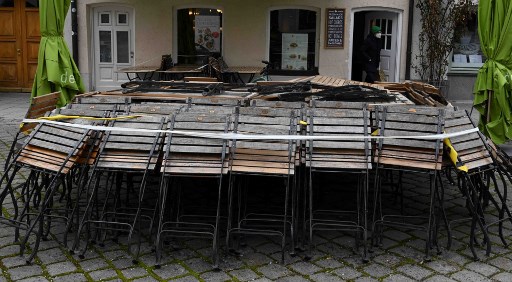
BERLIN, Germany (AFP) — Germany is poised to prolong and tighten its partial lockdown into April as new virus cases soar, according to a draft document seen by AFP ahead of a strategy meeting on Monday.
Europe’s biggest economy had begun easing restrictions, first reopening schools in late February, before allowing hairdressers and some shops to resume business in March.
The strategy meeting between Chancellor Angela Merkel and the leaders of Germany’s 16 states was originally scheduled to discuss a further relaxation, but a third wave of the virus driven by new variants has changed the agenda dramatically.
Lifting restrictions on dining, cultural and leisure facilities will now have to be delayed and instead, worst-hit areas may from Monday have to reimpose measures and order shops and some schools to close again.
“Without significant restrictions, the number of new infections will increase to the point that the health system risks being overwhelmed by April,” the draft report reads.
Requirements that employees work from home whenever possible will be extended to April 18, according to the document, instead of ending on March 28.
To prevent any contagion at the workplace, companies will be required to provide at least two rapid tests a week to employees who are unable to work from home, it said.
With an eye on upcoming Easter school holidays, those who go abroad would be required to be tested and go into quarantine when they return to Germany.
But a row was brewing over the thorny issue of whether to allow domestic holidays to take place.
Some regional leaders argue that it makes little sense to allow people to fly out to the Spanish island of Mallorca for their own holidays while banning residents from taking overnight stays in their own state.
German media reported however that Merkel is dissatisfied with the restrictions agreed so far, thinking that they don’t go far enough.
Emergency brakes’
On Monday, the national incidence rate reached 107.3 cases per 100,000 people, with more than 7,700 new cases and 50 deaths reported.
Merkel and regional leaders agreed at the last round of talks that authorities would tighten the screws again if that rate struck 100 over three days.
“Unfortunately, we are going to have to use these emergency brakes,” Merkel warned on Friday.
The draft document calls for these brakes to be brought in wherever they are necessary, and to be applied consistently across the country.
It lays the groundwork for the closure of some schools that have only just reopened, and urges people to avoid travelling over Easter.
“Given the current infection dynamics accelerated by the Covid-19 variants, forceful action is still required,” the text reads.
As the shutdown drags on, shop owners were watching developments nervously, with the German retailers’ association warning that 120,000 shops could go bust if the shutdown persists.
– ‘Exponential’ rise –
Health authorities warned on Friday that coronavirus case numbers are rising at a “very clearly exponential rate”.
“It is very possible that we will have… very high case numbers, many severe cases and deaths, and hospitals that are overwhelmed,” Lars Schaade, vice president of the Robert Koch Institute for infectious diseases, told reporters.
The grim news came with the country also struggling to accelerate its inoculation campaign.
Dogged by supply issues and mistrust over AstraZeneca’s jab, Germany’s vaccination campaign has been sluggish compared to the British or US programmes.
The use of AstraZeneca’s vaccine was suspended for several days last week by major European countries, including Germany, over fears it may cause blood clots.
After the EU medicines regulator cleared it for use following a review, Merkel herself sought to shore up confidence in the jab.
“Yes, I would take the AstraZeneca vaccine,” Merkel said on Friday.
© Agence France-Presse







